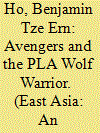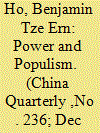| Srl | Item |
| 1 |
ID:
143787


|
|
|
|
|
| Summary/Abstract |
The preservation of face is an important concept in Chinese behavioral patterns, both at individual and national levels. Beyond national interest considerations, modern-day diplomacy between China and the world also involves substantially the exchange of face. This article will argue that face represents a relational understanding of how China views and interacts with the world. By linking face to three themes that international relations scholars frequently use in describing how China sees the world, namely, the tribute system, the Chinese memory of historical humiliation and China’s distrust of the American-led international system, the article hopes to show how the understanding of face—as a crucial element of Chinese identity—can inform scholars and practitioners in their attempts to engage China.
|
|
|
|
|
|
|
|
|
|
|
|
|
|
|
|
| 2 |
ID:
188433


|
|
|
|
|
| Summary/Abstract |
In recent years, some scholars of international politics have argued for the need to integrate the use of visual media into our understanding of global politics. In this respect, film (or movies) represents an effective media of communicating powerful ideas and political worldviews through a smorgasbord of sound and sensory experiences. This essay seeks to draw on the theoretical insights of scholars of visual international politics to analyze the ongoing geopolitical conflict between the United States and China. It will do so by examining two box-office hits in the West and China, namely, the Avengers and Wolf Warrior. Through a study of some of the key storylines in these films, this essay seeks to flesh out the differences in Sino-Western conceptions of patriotism, good and evil, and salvation. It argues that these differences are not just a matter of aesthetic preferences, but reflect more fundamental ideas and political worldviews salient in the thinking of China and the West.
|
|
|
|
|
|
|
|
|
|
|
|
|
|
|
|
| 3 |
ID:
167064


|
|
|
|
|
| Summary/Abstract |
Singapore's political system is sometimes criticized by proponents of liberal democracy as being highly authoritarian and inhibiting of individual freedom. Yet, as the recent 2015 general elections show, Singaporeans have largely consented to such a model as a legitimate social contract between themselves and the government. Given that the Singapore model is widely studied by Chinese officials as a positive pattern for governance, what do the latest results say about the future of the Chinese governing system, and to what extent is the Communist Party able to wield power while catering to populist sentiments, in particular the achievement of the Chinese dream?
|
|
|
|
|
|
|
|
|
|
|
|
|
|
|
|